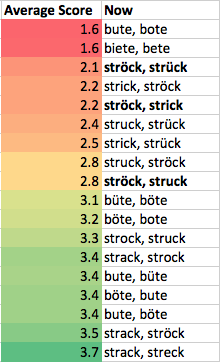- Survey Results (The Difficult Sounds of German for English speakers)
- A Two/Seven minute quiz for *non*-German speakers (and a much overdue update)
- How to learn (German) grammar with Anki
- I’m back!
- The book is sold!! (And info on site updates for the next 2 months)
Survey Results (The Difficult Sounds of German for English speakers)
Thanks to all who participated. Here are the (most important) word pairs that caused problems:
Scale: 1 – Sound the same (mit/mit). 2 – Very Similar (drücken/drucken). 3 – Similar (Pfüte, Pföte). 4 – Different (Pfeet/Pfit). 5 – Completely different (Meat/Mat)
Some analysis: The long vowels in biete/bete [i]/[e] and bote/bute [o]/[u] are extremely close in German, and I wasn’t surprised to see them at the top of the list.
Then comes a whole mess of difficulty between ströck [œ]/strück [ʏ]/struck [ɪ]/strick [ʊ]. Every combination of [œ], [ʏ], [ɪ] and [ʊ] was difficult, except for struck [ɪ]/strick [ʊ], which exists in English already (put/pit). I had trouble saying them a few times, which I’m sure didn’t help, but it’s a pretty challenging little group!
Aside from the major problem between the German [u] and [o] (bute/bote), there were some minor difficulties with every combination of büte [y], böte [ø], bute [u] and bote [o] except Büte/Bote [y]/[o]. Why that last combo seems easier than the rest of them may just be experimental error (For the statisticians out there: average 3.8, standard deviation 0.8)
The other minor difficulty seemed to be strock [ɔ] in contrast with strack [a] and struck [ʊ].
I’ve been preparing a list of tricky sounds in German, and this may be the last piece of the puzzle. I didn’t bother to test short vowels (Offen [ɔ]) vs long vowels (Ofen [o:]), because I already knew they were hard, and the quiz would have taken forever. Examples of these pairs are:
Offen/Ofen [ɔ]/[oː]
Ass/Aas [a]/[aː]
Busse/Buße [ʊ]/[uː] (Easier: similar to put/poot)
Bett/Beet [ɛ]/[eː]
Widder/wieder [ɪ]/[iː] (Easier: similar to pit/peet)
Hölle/Höhle [œ]/[øː]
fülle/fühle [ʏ]/[yː]
Bären/Beeren [ɛː]/[eː]
The only other vowel problem in German seems to be the two schwas (which is quite difficult!):
schöne/schöner [ə]/[ɐ]
I could also imagine some tricky consonant pairs between German and English:
German/English
dich/dish
Buch/book
Bach/balk
rot/wrote
pfan/fun
Tier/tear (drop)
As well as some vowel/diphthong pairs between German and English:
German [o] (Not) vs American [oʊ] (know)
German [e] (See) vs English [eɪ] (Say)
German [ɔʏ] (neu) vs English [ɔɪ] (boy)
German [ɐ] (schöner) or [ə] (schöne) vs American [ɚ] or British [ə] (river)
and perhaps German [u:] (Ute) vs some dialects of American [ʊu] (loon)
So….what?
As I mentioned in the previous post, I’m planning on making some effective pronunciation tools for as many languages as possible. There just isn’t very much for pronunciation out there, aside from Youtube tutorials and a few pronunciation guides online, and very few tests with immediate feedback, which seem to be the most effective method studied so far (there are a few apps that will test you on your ability to hear Chinese tones, but I’m not aware of anything else like that):
Tester: Is this “schöne” or “schöner?” (pause) ”Schöner”
Student: Answer: “Schöne”
Tester: Incorrect. It was “Schöner.”
In the linked study above, three 20-minute sessions of this sort of testing were able to (permanently) teach Japanese speakers to hear the L-R distinction in English. Anki provides immediate feedback, so there’s no reason why we can’t have some decent tools based upon this research, if we can find out where the problem sounds are and make good recordings. So stay tuned. I don’t know how long they’ll take, but I’ll get them done.
Some final notes on the quiz (and a link to the excel file!):
This was not a robust scientific study, although I do think I got good, useful data from it. I’m not a native speaker, so I would have to do it again with a native speaker recording to get valid data. Also, I’ve learned that I’m not supposed to use the 1-5 Likert scale for this sort of test. Rather, I should say “Struck/Strück…..Struck” or “Struck/Strück…..Strück”, and you’re supposed to say which one it was. I kind of prefer the Likert scale because there are times when I can hear a difference, but it’s so slight that I know it would cause me problems in the future, and I certainly would have trouble saying it, but I definitely understand the criticism. I’m also not supposed to say why I’m doing the test (“This is to figure out the hardest sounds in German”, etc). I’ll keep some of this in mind for the next test (probably French).

It might seem like a small thing, but I must say I am impressed to find someone on the Internet who (correctly!) cites research in support of a claim about language acquisition. Very interesting article, too.